北师大版选修六Unit 16 Stories 以读促写:Events in my life 课件 (共41张PPT)
文档属性
| 名称 | 北师大版选修六Unit 16 Stories 以读促写:Events in my life 课件 (共41张PPT) |  | |
| 格式 | zip | ||
| 文件大小 | 268.8KB | ||
| 资源类型 | 教案 | ||
| 版本资源 | 北师大版 | ||
| 科目 | 英语 | ||
| 更新时间 | 2018-11-23 09:27:30 | ||
图片预览

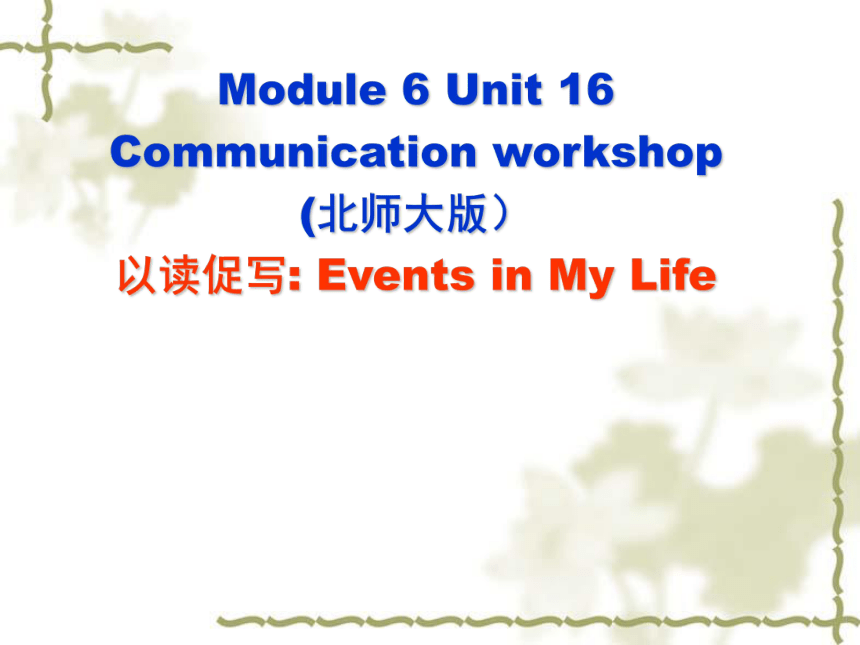

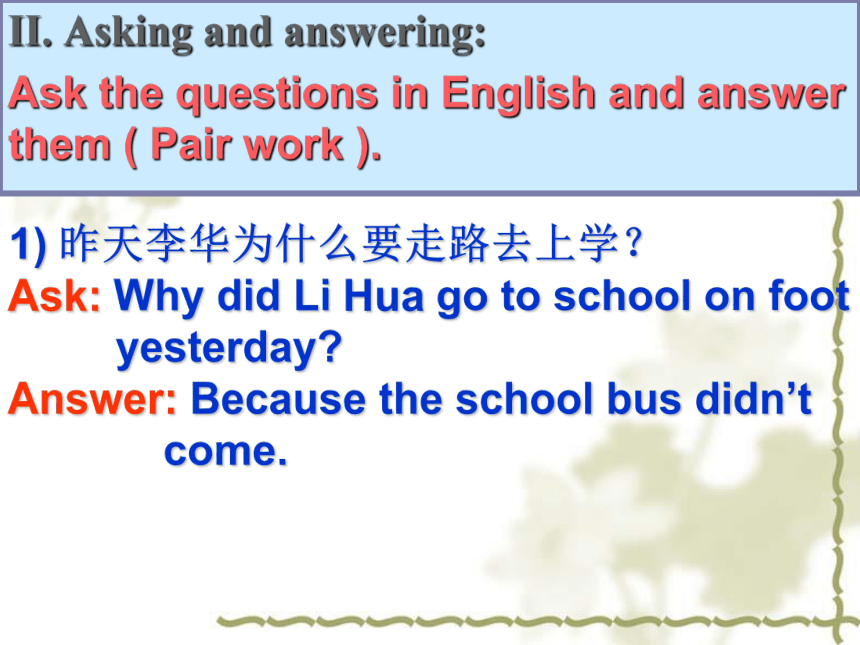
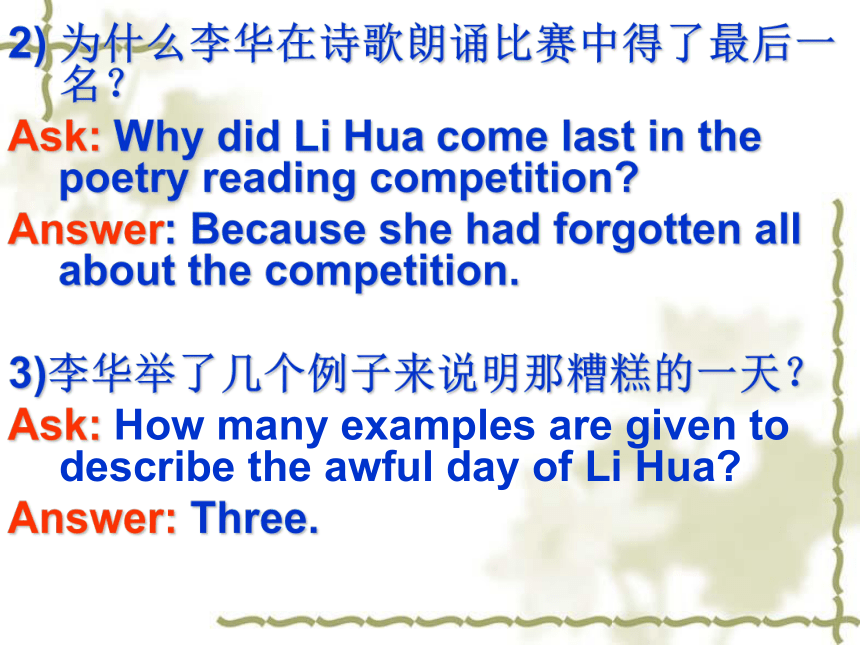
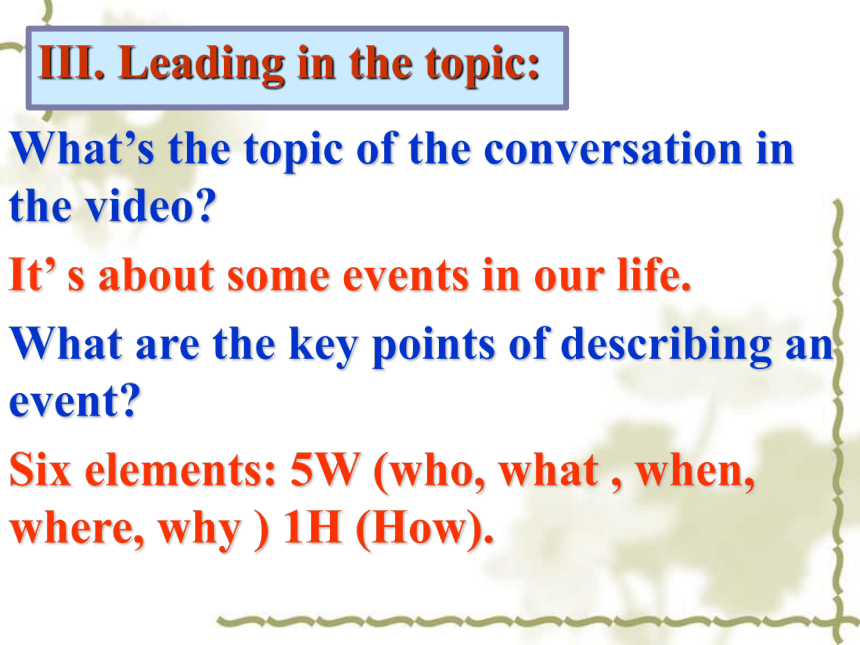
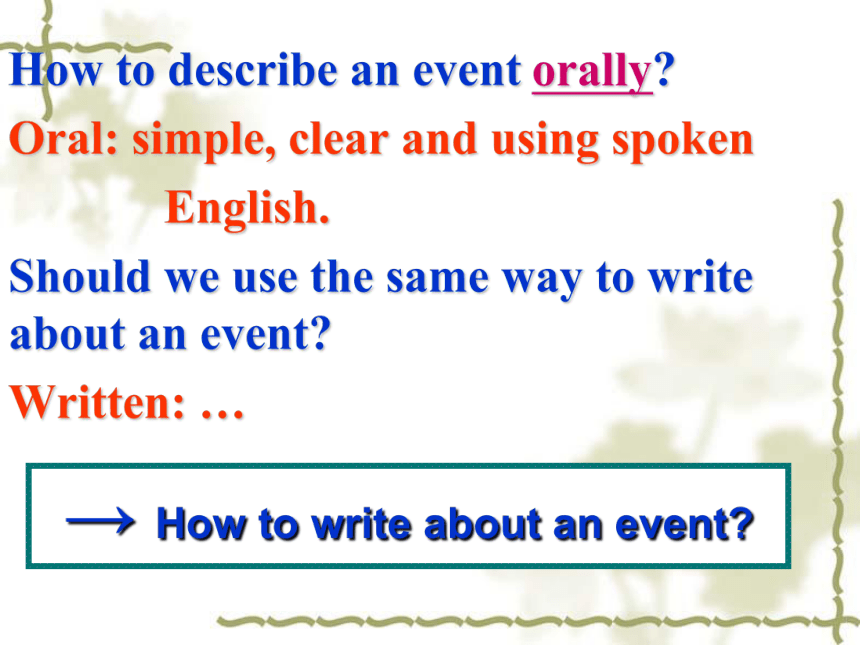


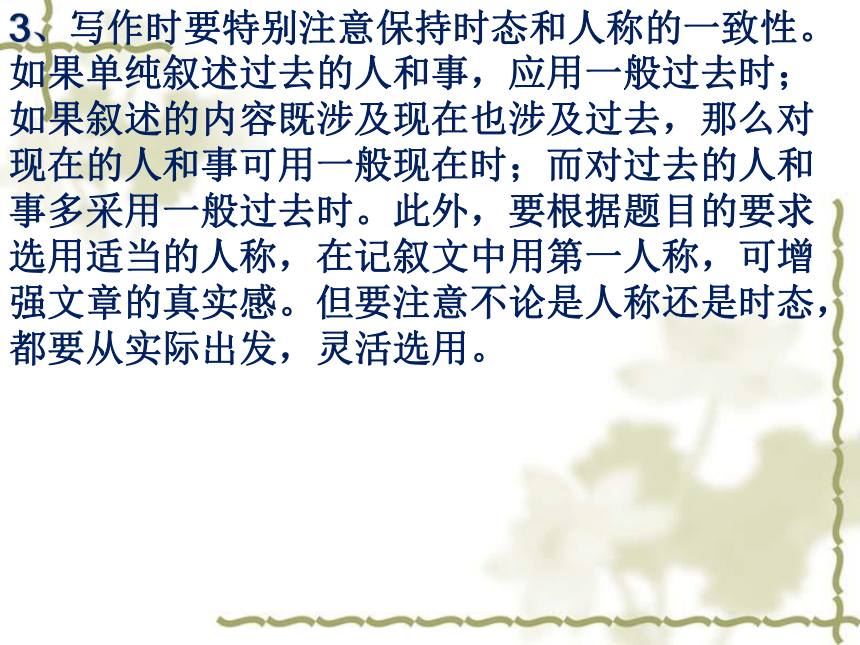
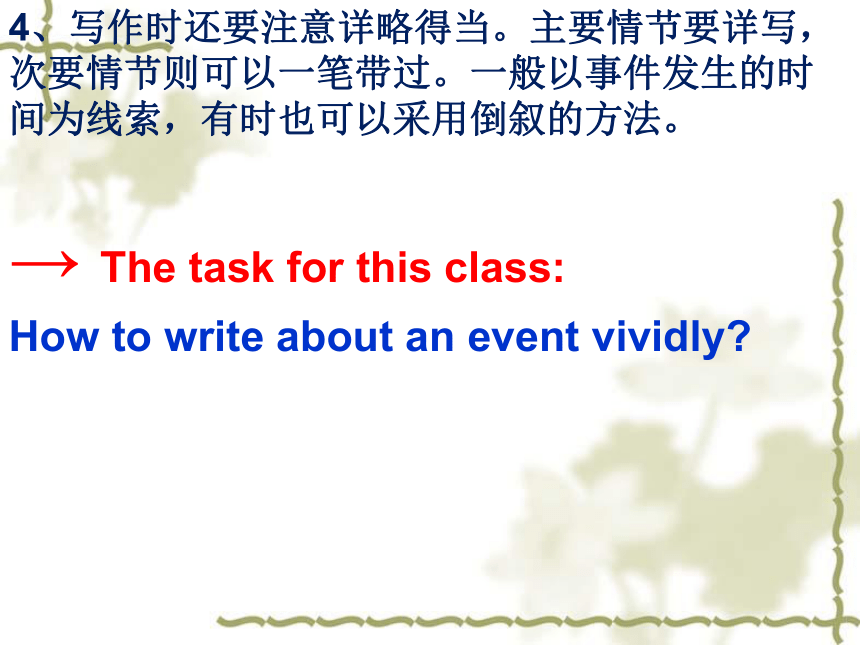

文档简介
课件41张PPT。Welcome to our classModule 6 Unit 16
Communication workshop
(北师大版)
以读促写: Events in My Life
I. Listening and viewing:
Watch the video with the following questions.1) 昨天李华为什么要走路去上学?
2) 为什么李华在诗歌朗诵比赛中得了最后一名?
3)李华举了几个例子来说明那糟糕的一天?II. Asking and answering:
Ask the questions in English and answer them ( Pair work ).1) 昨天李华为什么要走路去上学?
Ask: Why did Li Hua go to school on foot
yesterday?
Answer: Because the school bus didn’t
come.
2) 为什么李华在诗歌朗诵比赛中得了最后一名?
Ask: Why did Li Hua come last in the poetry reading competition?
Answer: Because she had forgotten all about the competition.
3)李华举了几个例子来说明那糟糕的一天?
Ask: How many examples are given to describe the awful day of Li Hua?
Answer: Three.
III. Leading in the topic:What’s the topic of the conversation in the video?
It’ s about some events in our life.
What are the key points of describing an event?
Six elements: 5W (who, what , when, where, why ) 1H (How).
How to describe an event orally?
Oral: simple, clear and using spoken
English.
Should we use the same way to write about an event?
Written: …
→ How to write about an event?1、描写一次事件属于记叙文的范畴,应当按照记叙文的写作要求来进行写作。一般来说,叙述好一次事件,要把握六大要素:when; where; who; what; why; how。
Teach yourself the following basic rules about how to describe an event before class :2、写作时应该先交代必要的背景,然后记叙事件的发生、发展以及结果。叙述时要注意使用表示时间先后顺序的连接词(如:at?first,then,a few minutes later等)使文章的过渡自然、连贯。最后结尾的部分通常记叙事件的结局,也可以表达与所述内容有关的感想或愿望。
3、写作时要特别注意保持时态和人称的一致性。如果单纯叙述过去的人和事,应用一般过去时;如果叙述的内容既涉及现在也涉及过去,那么对现在的人和事可用一般现在时;而对过去的人和事多采用一般过去时。此外,要根据题目的要求选用适当的人称,在记叙文中用第一人称,可增强文章的真实感。但要注意不论是人称还是时态,都要从实际出发,灵活选用。
4、写作时还要注意详略得当。主要情节要详写,次要情节则可以一笔带过。一般以事件发生的时间为线索,有时也可以采用倒叙的方法。
→ The task for this class:
How to write about an event vividly?
Read the three drafts of a student’s composition on the topic “ A Day When Everything Went Wrong”. Decide which one is the most interesting.IV. Reading and comparing :1. Think about how the writer:
1) attracts the attention of the reader (G 1).
2) shows the order of events (G 2).
3) shares feelings with the reader (G 3).
4) uses vivid language to make the writing more interesting (G 4).
2. Find out the beautiful expressions and write them down on the handout to fill in the mind map.
V. Thinking and learning :Show the whole mind map.
Try to find out some rules about how to describe an event vividly according to the expressions from Draft C.
T helps the students make a conclusion of the rules.
VI. Finding out the rules:Rules of writing about events in our life vividly:
1. How to attract the readers attention:
Use some expressions which can draw readers’ attention and make them interested in what continues.
Some possible expressions:
1) …live in my mind forever…
2) But the trouble was only just beginning.
3) ...my troubles were not over.
4) …was a day that I would never forget, because I experienced something unexpected that day.
5)… I had an experience that I will never forget in my life.
6) Everyone?has?an?unforgettable?memory?
and?cannot?remove?it.?
7) …?and?I?still?remember?the?whole?process
vividly.
8) It?was?a?sunny?day?and?things?were?
awfully?/very … (形容词)
9) Whenever?I?look?back?on?what?happened?
that?day,?I?think?it?is… (形容词)
2. How to show the order of events:
Use some transitional words and phrases to make the order clearly.
起:One day; First of all;
At the beginning of;
承:and then; later; after doing/that/a few days/a while; by this time(此时); at that time; at the same time; during…; As I…; When I…; 转:Normally…but…; anyway;
even though; otherwise; fortunately; luckily; unfortunately; after all ; however; on the contrary; what’s worse; no doubt…
合:above all ; as a result; accordingly 于是;
by doing so 如此; eventually 最后; at last…
; 3. How to share feelings with the readers:
use suitable adjectives and adverbs to make your writing more interesting. For example, “boiling hot” instead of “very hot” to describe the weather. 4. How to make the writing more
interesting by using vivid language.
Use different phrases, sentence patterns and use details to paint a more interesting picture for your readers. For example, Draft C includes the English teacher’s direct speech, which is more interesting and lively than reported speech.
( Finish the rewriting task according to the expressions and rules above. )
VII. Writing:
1. Try to make the following passage
more interesting and vivid.An unforgettable day
Last Friday, after I had got away from my friend’s birthday party, I went to the bus station. When the bus came, I didn’t notice it was a wrong bus. Because I was very tired, I fell asleep quickly. When I woke up, I realized that I was in a unknown place. I wandered at the station and felt frightened. A taxi driver helped me and gave me a ride to my home. 2. Peer- reading:
read your partner’s writing, and try to find out the beautiful expressions.
(Mark G (good); VG (very good); E (excellent ); A (amazing) to show the level of the beautiful expressions.)
One possible version:
An unforgettable day
Last Friday was a day that I would never forget, because I experienced something unexpected that day.
After I had got away from my friend’s birthday party, I was happy on my way to the bus station. Then came a bus and I got on immediately without noticing it was a wrong bus. I got so tired that I fell asleep quickly. Hardly had I woken up when I realized that I was in a completely unknown place. As it was getting dark, the fear in my heart grew while I was wandering at the station. Suddenly, I heard a gentle voice, “ Can I help you?” It was a taxi driver. After telling him about my trouble, he offered to give me a ride to my home.
How grateful I was! It was a special day, which would live in my mind forever.VIII. Assignment:
Write about a memorable day or event in your life. The day or event may be memorable for being happy, exciting, funny, sad, embarrassing, etc.Some tips:【写作要领】
1.抓住内容要点
2.正确使用时态
3.恰当选用过渡词语
4.变化表达方式Answer the questions to assess your writing:
1. Have you tried to attract the attention of the readers? How?
2. Have you shown the sequence of the events? How?
3. Have you shared your feelings directly? Give an example.
4. Have you used vivid language to make the writing more interesting? Give an example.
5. Did you remember to check your writing for mistakes?Thank you for your listening!1.The day started to go wrong the instant I left home.(Page 12)
那一天,我一离开家就开始不走运。
the instant是名词词组在句中用作连词,引导时间状语从句,译为“一……就……”。
The instant Tom saw his teacher,he ran away.
汤姆一看见他的老师就跑开了。
I recognized her the instant I saw her.
我一眼就认出了她。引导时间状语从句的特殊连词
every/each time每次
next time下次
the first time第一次
Communication workshop
(北师大版)
以读促写: Events in My Life
I. Listening and viewing:
Watch the video with the following questions.1) 昨天李华为什么要走路去上学?
2) 为什么李华在诗歌朗诵比赛中得了最后一名?
3)李华举了几个例子来说明那糟糕的一天?II. Asking and answering:
Ask the questions in English and answer them ( Pair work ).1) 昨天李华为什么要走路去上学?
Ask: Why did Li Hua go to school on foot
yesterday?
Answer: Because the school bus didn’t
come.
2) 为什么李华在诗歌朗诵比赛中得了最后一名?
Ask: Why did Li Hua come last in the poetry reading competition?
Answer: Because she had forgotten all about the competition.
3)李华举了几个例子来说明那糟糕的一天?
Ask: How many examples are given to describe the awful day of Li Hua?
Answer: Three.
III. Leading in the topic:What’s the topic of the conversation in the video?
It’ s about some events in our life.
What are the key points of describing an event?
Six elements: 5W (who, what , when, where, why ) 1H (How).
How to describe an event orally?
Oral: simple, clear and using spoken
English.
Should we use the same way to write about an event?
Written: …
→ How to write about an event?1、描写一次事件属于记叙文的范畴,应当按照记叙文的写作要求来进行写作。一般来说,叙述好一次事件,要把握六大要素:when; where; who; what; why; how。
Teach yourself the following basic rules about how to describe an event before class :2、写作时应该先交代必要的背景,然后记叙事件的发生、发展以及结果。叙述时要注意使用表示时间先后顺序的连接词(如:at?first,then,a few minutes later等)使文章的过渡自然、连贯。最后结尾的部分通常记叙事件的结局,也可以表达与所述内容有关的感想或愿望。
3、写作时要特别注意保持时态和人称的一致性。如果单纯叙述过去的人和事,应用一般过去时;如果叙述的内容既涉及现在也涉及过去,那么对现在的人和事可用一般现在时;而对过去的人和事多采用一般过去时。此外,要根据题目的要求选用适当的人称,在记叙文中用第一人称,可增强文章的真实感。但要注意不论是人称还是时态,都要从实际出发,灵活选用。
4、写作时还要注意详略得当。主要情节要详写,次要情节则可以一笔带过。一般以事件发生的时间为线索,有时也可以采用倒叙的方法。
→ The task for this class:
How to write about an event vividly?
Read the three drafts of a student’s composition on the topic “ A Day When Everything Went Wrong”. Decide which one is the most interesting.IV. Reading and comparing :1. Think about how the writer:
1) attracts the attention of the reader (G 1).
2) shows the order of events (G 2).
3) shares feelings with the reader (G 3).
4) uses vivid language to make the writing more interesting (G 4).
2. Find out the beautiful expressions and write them down on the handout to fill in the mind map.
V. Thinking and learning :Show the whole mind map.
Try to find out some rules about how to describe an event vividly according to the expressions from Draft C.
T helps the students make a conclusion of the rules.
VI. Finding out the rules:Rules of writing about events in our life vividly:
1. How to attract the readers attention:
Use some expressions which can draw readers’ attention and make them interested in what continues.
Some possible expressions:
1) …live in my mind forever…
2) But the trouble was only just beginning.
3) ...my troubles were not over.
4) …was a day that I would never forget, because I experienced something unexpected that day.
5)… I had an experience that I will never forget in my life.
6) Everyone?has?an?unforgettable?memory?
and?cannot?remove?it.?
7) …?and?I?still?remember?the?whole?process
vividly.
8) It?was?a?sunny?day?and?things?were?
awfully?/very … (形容词)
9) Whenever?I?look?back?on?what?happened?
that?day,?I?think?it?is… (形容词)
2. How to show the order of events:
Use some transitional words and phrases to make the order clearly.
起:One day; First of all;
At the beginning of;
承:and then; later; after doing/that/a few days/a while; by this time(此时); at that time; at the same time; during…; As I…; When I…; 转:Normally…but…; anyway;
even though; otherwise; fortunately; luckily; unfortunately; after all ; however; on the contrary; what’s worse; no doubt…
合:above all ; as a result; accordingly 于是;
by doing so 如此; eventually 最后; at last…
; 3. How to share feelings with the readers:
use suitable adjectives and adverbs to make your writing more interesting. For example, “boiling hot” instead of “very hot” to describe the weather. 4. How to make the writing more
interesting by using vivid language.
Use different phrases, sentence patterns and use details to paint a more interesting picture for your readers. For example, Draft C includes the English teacher’s direct speech, which is more interesting and lively than reported speech.
( Finish the rewriting task according to the expressions and rules above. )
VII. Writing:
1. Try to make the following passage
more interesting and vivid.An unforgettable day
Last Friday, after I had got away from my friend’s birthday party, I went to the bus station. When the bus came, I didn’t notice it was a wrong bus. Because I was very tired, I fell asleep quickly. When I woke up, I realized that I was in a unknown place. I wandered at the station and felt frightened. A taxi driver helped me and gave me a ride to my home. 2. Peer- reading:
read your partner’s writing, and try to find out the beautiful expressions.
(Mark G (good); VG (very good); E (excellent ); A (amazing) to show the level of the beautiful expressions.)
One possible version:
An unforgettable day
Last Friday was a day that I would never forget, because I experienced something unexpected that day.
After I had got away from my friend’s birthday party, I was happy on my way to the bus station. Then came a bus and I got on immediately without noticing it was a wrong bus. I got so tired that I fell asleep quickly. Hardly had I woken up when I realized that I was in a completely unknown place. As it was getting dark, the fear in my heart grew while I was wandering at the station. Suddenly, I heard a gentle voice, “ Can I help you?” It was a taxi driver. After telling him about my trouble, he offered to give me a ride to my home.
How grateful I was! It was a special day, which would live in my mind forever.VIII. Assignment:
Write about a memorable day or event in your life. The day or event may be memorable for being happy, exciting, funny, sad, embarrassing, etc.Some tips:【写作要领】
1.抓住内容要点
2.正确使用时态
3.恰当选用过渡词语
4.变化表达方式Answer the questions to assess your writing:
1. Have you tried to attract the attention of the readers? How?
2. Have you shown the sequence of the events? How?
3. Have you shared your feelings directly? Give an example.
4. Have you used vivid language to make the writing more interesting? Give an example.
5. Did you remember to check your writing for mistakes?Thank you for your listening!1.The day started to go wrong the instant I left home.(Page 12)
那一天,我一离开家就开始不走运。
the instant是名词词组在句中用作连词,引导时间状语从句,译为“一……就……”。
The instant Tom saw his teacher,he ran away.
汤姆一看见他的老师就跑开了。
I recognized her the instant I saw her.
我一眼就认出了她。引导时间状语从句的特殊连词
every/each time每次
next time下次
the first time第一次
